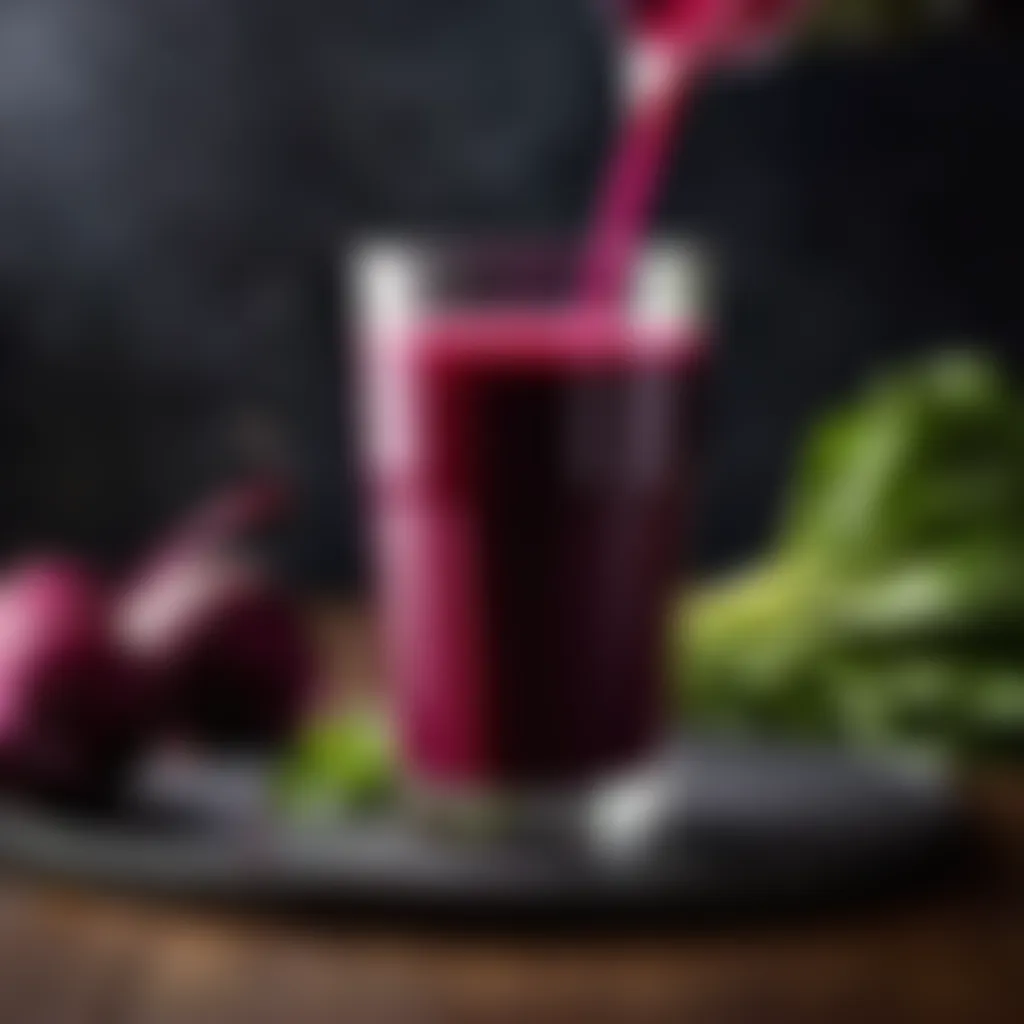Discovering the Health Benefits of Beetroot


Intro
Beetroot, often seen as humble and simple, packs a punch when it comes to health benefits. This vibrant vegetable not only adds a splash of color to your plate but also offers a bounty of nutrition that many are only just beginning to discover. Coupled with its earthy sweetness, beetroot can easily elevate everyday meals into something special.
In the kitchen, it's versatile—whether it’s roasted, blended into smoothies, or used raw in salads. This article will provide you with a thorough understanding of how beetroot can positively impact your health, along with practical recipes that cater to a variety of tastes.
So, ready to roll up those sleeves and dive into the world of beetroot? Let’s start with what you’ll need.
Ingredients:
- Beetroots: 4 medium-sized, peeled and chopped
- Olive oil: 2 tablespoons
- Garlic: 2 cloves, minced
- Fresh lemon juice: From 1 medium lemon
- Feta cheese: 100 grams, crumbled
- Walnuts: 50 grams, roughly chopped
- Spinach: 4 cups, fresh
- Salt: To taste
- Black pepper: To taste
Preparation Steps:
- Prepare the Beetroots: Start by washing, peeling, and chopping the beetroots into small cubes. This will ensure they cook evenly.
- Preheat the Oven: Set your oven to 200°C (about 400°F). Roasting beetroots elevates their natural sweetness and adds depth to the flavor.
- Mix with Olive Oil and Garlic: In a bowl, toss the beetroot cubes with olive oil, minced garlic, salt, and black pepper. Make sure each piece is coated well.
- Roast the Beetroots: Spread the beetroot mixture onto a baking sheet lined with parchment paper. Roast in the preheated oven for approximately 30-35 minutes, or until tender. Stir halfway through to ensure even roasting.
- Prepare the Spinach: While the beetroots are roasting, rinse the spinach under cool water. If using sturdy leaves, consider chopping them roughly.
- Make the Dressing: In a small bowl, combine fresh lemon juice and a pinch of salt, whisking in some olive oil to create a simple dressing.
- Combine All Ingredients: Once the beetroots are nicely roasted and cooled a bit, add them to a large bowl with the spinach, walnuts, and crumbled feta. Drizzle the dressing on top and mix gently to combine all.
Technical Aspects:
- Temperature Settings: Ensure your oven reaches the desired temperature before roasting to avoid undercooked beets.
- Timing Specifics: Watch those beetroots closely after the 30-minute mark; they can go from perfectly tender to overdone in a flash.
- Critical Techniques: Tossing the beetroot halfway through roasting is key for an even cook.
Cooking Process:
- Once everything is combined, let it sit for a few minutes. This allows the flavors to meld nicely.
- Taste and adjust the seasoning if necessary. Feel free to sprinkle more feta or nuts for additional texture and flavor.
- Serve while warm or at room temperature; either way, it’s delicious.
Troubleshooting Tips:
- Beetroot Too Hard?: If your beetroot cubes aren’t tender after roasting, cover the pan with foil and return them to the oven for an additional 10 minutes.
- Want More Flavor?: Consider adding fresh herbs like basil or mint to enhance the dish.
"Incorporating beetroot into your meals not only enriches your diet but also adds a layer of complexity to traditional recipes."
This beetroot dish transforms your expectations and highlights how this simple veg could make waves on your dinner table. The taste is not just about health; it’s about elevating the everyday into the extraordinary.
Prologue to Beetroot
Beetroot has gained traction not only in culinary circles but also amid health enthusiasts. This vibrant root vegetable is becoming a staple not just for its striking color but for a whole host of benefits that come with it. In this article, we take a close look at beetroot’s intriguing properties and explore how they contribute to overall health. Beyond just being a tasty addition to meals, beetroot is packed with nutrients that can enhance well-being in multiple ways.
From lowering blood pressure to boosting performance during workouts, the importance of beetroot transcends mere dietary trends. Understanding its origins, nutrient composition, and health benefits helps make a strong case for incorporating this vegetable into daily life.
Origins and Historical Significance
Beetroots have a history stretching back thousands of years, originating in the Mediterranean region. Ancient cultures valued beets not just for their taste but also for their medicinal properties. The Romans, for instance, used beetroot for various ailments, believing in its ability to improve overall health. Over the years, it spread across Europe and eventually became popular worldwide.
Historically, beetroot has been associated with vitality and strength, garnering respect in both culinary and medicinal fields. The deep, rich color symbolizes health and wellness; it was often used for dyeing fabrics, further showcasing its versatility.
Nutritive Composition of Beetroot
When diving into the nutritive profile of beetroot, you find a rich blend of vitamins and minerals alongside vibrant phytochemicals. This vegetable isn’t just low in calories; it’s a powerhouse of nutrients that contribute significantly to health.
Vitamins and Minerals
Beetroot is loaded with essential vitamins and minerals, which play vital roles in various bodily functions. Key players include Vitamin C, folate, potassium, and iron.
- Vitamin C helps bolster the immune system, making it a beneficial choice during cold season.
- Folate is essential for DNA synthesis, particularly important for expectant mothers.
- Potassium aids in maintaining healthy blood pressure levels by countering sodium's effects.
- Iron is crucial for oxygen transport in the blood, energizing those who might feel fatigued.
One unique feature of beetroot’s mineral content is its natural nitrates, which have been shown to enhance cardiovascular health. This attribute makes beetroot a popular option for those concerned about heart health.
Phytochemicals and Antioxidants


Phytochemicals found in beetroot, particularly betalains, provide impressive antioxidant properties.
- These compounds are thought to combat oxidative stress, reducing the risk of chronic diseases.
- Betalains are also responsible for the beet's vibrant hue, serving both aesthetic and health purposes.
One major advantage of phytochemicals is their ability to support detoxification processes. They help neutralize harmful compounds in the body, celebrating the notion that food can truly be medicine, while giving beets an edge in the health benefits arena.
Caloric Value and Dietary Fiber
Another prized aspect of beetroot is its remarkable low caloric value combined with a generous amount of dietary fiber.
- A serving of beetroot has roughly 44 calories, making it an ideal choice for those looking to manage weight.
- The fiber content aids digestion, helping to keep you feeling full.
Unlike many root vegetables that might be heavy in carbs, beetroot offers a satisfying crunch with fewer calories. This makes it a suitable option for various diets, whether one is reducing carbs or looking for a healthy snack.
Health Benefits of Beetroot
Beetroot isn't just known for its vibrant color; it's a powerhouse of health benefits that many people might overlook. It's important to understand how incorporating beetroot into daily meals can improve various aspects of well-being ranging from cardiovascular health to detoxification support. With its unique nutrients and flavors, beetroot holds a special place in the culinary and health worlds alike.
Cardiovascular Health
Maintaining good cardiovascular health plays a pivotal role in overall wellness. Beetroot, rich in nitrates, converts into nitric oxide in the body, enhancing blood flow and lowering blood pressure. This process not only helps prevent heart disease but also promotes overall heart health.
Blood Pressure Regulation
One remarkable characteristic of beetroot is its ability to regulate blood pressure levels. Research shows that regular consumption of beetroot juice can lead to noticeable reductions in blood pressure, particularly in individuals with hypertension. This makes beetroot a particularly advantageous option for those seeking natural solutions to manage their cardiovascular health. The unique feature of beetroot in this context lies in its high nitrate content, which relaxes blood vessels and improves circulation. While the taste might not be for everyone, the benefits far outweigh any initial hesitation.
Heart Function Enhancement
Betting on beetroot can be a solid choice for heart function enhancement too. The vegetable is packed with antioxidants that combat free radicals, contributing to a healthier heart. This healthful vegetable not only fosters better heart function but also can be considered a favorite by nutritionists. Its anti-inflammatory properties are an added bonus, promoting a stronger cardiovascular system overall. Consequently, opting for beetroot can have lasting advantages, especially for individuals looking to boost heart health while enjoying tasty culinary options.
Cholesterol Management
When it comes to cholesterol management, beetroot may help lower LDL cholesterol levels. This key characteristic makes beetroot a popular choice among those conscious of their heart health. The soluble fiber in beetroot helps clear cholesterol from the bloodstream while supporting healthy digestion. However, one should consider the balance in their overall diet, as relying solely on beetroot might not yield the desired effects without other dietary adjustments. Incorporating beetroot, along with other healthy fats, can be a smart strategy to maintain optimal cholesterol levels.
Anti-Inflammatory Properties
Beetroot's anti-inflammatory properties are another crucial aspect of its health benefits. Chronic inflammation has been linked to several diseases, and including anti-inflammatory foods can help mitigate these issues.
Reducing Systemic Inflammation
Beetroot shines in its ability to reduce systemic inflammation. With its wealth of betalains, a type of antioxidant, beetroot can significantly aid in lowering inflammation markers in the body. This trait makes it a valuable addition to a diet aimed at combating chronic diseases. As the body experiences less inflammation, individuals might find improved comfort and health over time. It’s worth noting, however, that while beetroot is effective, it should be part of a broader anti-inflammatory strategy that includes other fruits and vegetables.
Effects on Chronic Conditions
The impact of beetroot's anti-inflammatory properties extends to chronic conditions such as arthritis and heart disease. This feature makes beetroot particularly revered among those dealing with long-term health issues. By helping to manage and lower inflammation, beetroot plays a role in potentially easing the burden of chronic discomfort. Still, individuals must consult their healthcare professionals for tailored diet plans, as not every strategy suits everyone.
Boosting Athletic Performance
For athletes or active individuals, incorporating beetroot can function as a natural ergogenic aid to improve performance during rigorous activities.
Oxygen Consumption Enhancement
One of the most appealing aspects of beetroot for athletes is its ability to enhance oxygen consumption. This benefit is invaluable during endurance training and high-intensity workouts. The nitrates transform into nitric oxide, improving blood flow and oxygen delivery to muscles, which can result in enhanced performance. This unique feature of beetroot makes it a popular choice among fitness enthusiasts looking for a natural boost without resorting to supplements.
Stamina and Endurance
Moreover, beetroot positively affects stamina and endurance. Many athletes swear by beetroot juice as a pre-workout drink due to its proven benefits in delaying fatigue. This can be a game-changer for anyone looking to maximize their workouts. However, it's essential to consider individual responses, as some might find they experience varying degrees of effect from consumption.


Detoxification Support
Beetroot is often hailed for its detoxifying properties, supporting liver function and cleansing the body of toxins.
Liver Function Improvement
Beetroot is known to improve liver function due to its rich content of antioxidants and nutrients. A healthy liver is crucial for overall detoxification, processing toxins, and metabolizing nutrients efficiently. The liver must stay in tip-top shape for optimal wellbeing, and beetroot can play a supportive role. It’s worth noting that while beetroot is beneficial, it is more effective when combined with a holistic approach to liver health, including hydration and a balanced diet.
Natural Cleansing Properties
Another intriguing aspect is beetroot's natural cleansing properties. Regular consumption helps promote a healthy digestive system, which is an integral part of the body's detoxification process. With its fiber content, beetroot encourages regularity, also supporting overall colon health. However, moderation is key. Too much beetroot might lead to digestive discomfort for some, so it’s wise to enjoy it as part of a well-rounded diet.
Cognitive Function Enhancement
As we age, cognitive function becomes a top concern for many people. Beetroot can be beneficial here as well, enhancing memory and brain health.
Neuroprotective Effects
Beetroot contains compounds that support neuroprotective effects, which can be especially important in staving off conditions like dementia. Its high antioxidant levels contribute to overall brain health by neutralizing harmful free radicals. Focusing on improving brain health with beetroot is becoming increasingly relevant among those concerned about cognitive decline. While it won't replace medical advice, including beetroot in the diet may bolster cognitive resilience.
Blood Flow to the Brain
Increased blood flow to the brain is another important aspect of beetroot's contribution to cognitive health. The nitric oxide helps widen blood vessels, improving circulation in the brain, which can aid focus and cognitive performance. As some might find the flavor of beetroot quite appealing, incorporating it into meals can be both a delicious and pragmatic choice. However, it’s crucial to strike a balance with other nutrient-dense foods for holistic brain health.
Incorporating Beetroot into the Diet
Adding beetroot to one’s diet is not just about embracing a colorful ingredient; it’s about tapping into a powerhouse of health benefits that this root vegetable provides. With a unique blend of essential vitamins and minerals, as well as phytochemicals and antioxidants, beetroot promises a myriad of advantages—but you need to know how to incorporate it effectively into your daily meals. This exploration seeks to present the importance of selecting the right fresh beetroot, mastering preparation techniques, and crafting delicious recipes that not only tantalize the taste buds but also uphold nutritious value.
Selecting Fresh Beetroot
Visual Indicators of Freshness
When it comes to choosing fresh beetroot, it’s crucial to recognize certain visual cues that indicate quality. A healthy beetroot usually boasts smooth, unblemished skin, which shines in vibrant shades of deep red or purple. The greens, if attached, should appear crisp and lively, not wilted or brown. The firmness of the beetroot is also a key element; a solid feel is a sign of freshness, while any soft spots suggest over-ripeness.
The key aspect here? Fresh beetroot translates to better taste and higher nutritional content.
- Benefits: Consuming fresh beetroot ensures you maximize health benefits, from improved digestion to enhanced mood.
- Drawbacks: Opting for overripe roots might leave you with a bland taste and less vibrant nutrients.
Seasonality and Storage
Understanding the seasonality of beetroot can play a significant role in ensuring you get the freshest produce. Generally, beetroot is in season from late summer through early spring. Purchasing them during this period means you are likely wide of robust flavor and nutritional density. And, if you buy in bulk, proper storage becomes your new best friend. Ideally, keep beetroot in a cool, dark place, such as a root cellar, to maintain their quality longer.
This points to a key trait of beetroot:
- Seasonality Matters: Freshly harvested beetroots taste better and are richer in nutrients.
- Storage Issues: If improperly stored, they might lose their texture and flavor quickly, which could impact the overall satisfaction of your meals.
Preparation Techniques
Roasting and Boiling
Two popular methods for preparing beetroot are roasting and boiling. Roasting brings out the natural sweetness of beetroot, resulting in an extraordinary flavor profile. Just peel, cut them into wedges, toss with a dash of olive oil, herbs, and seasoning, then pop in the oven. Generally, it takes about 30-40 minutes until perfectly tender.
However, boiling is also a friendlier option for those pressed for time. It delivers tender beetroot in as little as 20 minutes. But beware—boiling can leach some nutrients into the water, which might compromise the health benefits.
- Benefits: Roasting caramelizes the natural sugars, while boiling offers a quick cooking solution.
- Disadvantages: Over-boiling can lead to nutrient loss and may result in mushy beetroot.
Raw Consumption Methods


Eating beetroot raw can be a refreshing choice, retaining all their nutrients and providing a crunchy texture that’s quite enjoyable. Shredding the raw beetroot to add to salads injects some vibrancy into your plate; it can also be sliced finely into wraps or sandwiches. The earthiness of raw beetroot pairs beautifully with tangy dressings.
An essential characteristic here is the unaltered nutrients:
- Nutrient Preservation: Raw consumption means getting the maximum benefit from vitamins and antioxidants.
- Flavor Limitation: It may taste quite earthier compared to cooked preparations, which some might find a turn-off.
Juicing Beetroot
Juicing is another innovative way to enjoy beetroot, offering a concentrated form of its nutrients. Whether you’re combining beetroot with other fruits or vegetables in a smoothie, the process extracts the vibrant juices and maintains significant nutritional value. A beetroot juice in the morning can be refreshing and worth the effort.
Juicing highlights:
- Convenient Nutritional Boost: Juices provide a quick and effective way to consume essential vitamins and minerals.
- Pulp Issues: However, juicing can leave out the dietary fiber, which is typically beneficial for gut health.
Crafting Delicious Recipes
Beetroot Salad Variations
Beetroot salads can be a delightful addition to any meal, with endless variations to suit any palate. Mixing roasted beetroot with goat cheese, walnuts, and a tangy vinaigrette can transform a simple dish into a gourmet experience. Each variation plays on the earthy sweetness of beetroot while introducing complementary flavors and textures.
The diversity of beetroot salad combinations maintains interest while providing necessary nutrients.
- Versatile Dishes: There’s no limit; you can tailor it to fit any occasion by mixing and matching seasonal veggies.
- Balancing Act: Be careful with dressings; heavy dressings can overpower the delicate flavor of beetroot.
Soups Featuring Beetroot
Beetroot soup, like Borscht, has gained popularity for a reason. Its rich, vibrant color and earthy flavor create a wholesome experience. Typically made with broth, beetroots, and various seasonings, this soup can be served hot or cold, making it ideal for any season.
The noteworthy aspect of beetroot soup?
- Warm Comfort: A warm bowl of beetroot soup can be cozy, especially in cooler weather, while maintaining a healthy profile.
- Texture Diversity: Ensure a smooth blending process to achieve that creamy texture without any gritty bits.
Beetroot Smoothies and Juices
Combining beetroot into smoothies brings a unique flavor twist. Not only do they add a splash of color, but beetroot pairs remarkably well with fruits like apples and berries. A simple blend can work wonders for your morning health routine as it provides a powerful surge of energy to kick-start your day.
The attributes of beetroot smoothies include:
- Nutritious Base: They are a fantastic way to sneak in goodness for even the pickiest eaters.
- Potential Overwhelm: Too much beetroot can dominate the flavor, so balance it well with other ingredients to improve the overall taste.
In summary, beetroot presents an incredibly versatile option to enhance any diet. From selecting the freshest roots and uncovering proper preparation methods to crafting mouthwatering recipes, each aspect enriches not just the flavor but also the myriad health benefits they promise.
Finale and Final Thoughts
In wrapping up our exploration of beetroot, it’s essential to recognize its multifaceted roles in promoting health and wellness. This vibrant vegetable isn’t just a visual treat; it offers a slew of health advantages that can enrich one’s diet remarkably. From bolstering cardiovascular health to aiding detoxification, beetroot serves as a powerhouse of nutrients that deserves more attention on our plates.
Summary of Health Benefits
Beetroot shines in numerous aspects:
- Cardiovascular Health: Regular consumption can help regulate blood pressure due to its high nitrate content, enhancing circulation and boosting overall heart function.
- Anti-Inflammatory Properties: The vegetable's unique phytonutrients work wonders against chronic inflammation, potentially alleviating conditions like arthritis.
- Boosting Athletic Performance: Athletes often tap into beetroot’s ability to enhance oxygen flow and stamina, making it a favored addition to pre-workout meals.
- Detoxification Support: Beetroot is considered beneficial for liver health, promoting natural detoxification through its high antioxidant levels.
- Cognitive Function Enhancement: It's believed that beetroot can improve blood flow to the brain, possibly enhancing memory and overall cognitive abilities.
Such a wealth of benefits makes beetroot a superb candidate for any household looking to boost nutrition. And the best part? Incorporating it into meals is as simple as pie.
Encouragement for Inclusion in Diet
As a busy housewife, you’re always on the lookout for nourishing ingredients that are not only easy to prep but also enriching for your family’s health. Beetroot fits the bill perfectly. Its versatility in the kitchen helps it seamlessly merge into a variety of dishes. Whether it’s a colorful salad, hearty soup, or refreshing juice, bending beetroot into your weekly meal planning can be a game changer. You can even sneak it into smoothies for a nutrient boost without the kiddos noticing!
Incorporating beetroot into your diet needn't feel daunting. Here are a few simple tips to get you started:
- Experiment with Recipes: Don’t limit yourself; dive into beetroot salads, soups, or even baked goods.
- Mix with Familiar Flavors: Pair it with goat cheese, walnuts, or citrus to brighten up its earthy sweetness.
- Try Baby Steps: Start by adding a small amount to your meals and gradually increase as your family gets accustomed to it.
Ultimately, giving beetroot a rightful place in your kitchen may not only enhance the health of your family but also introduce them to a spectrum of exciting flavors that are decidedly delightful. Don’t let its humble appearance fool you; beetroot is brimming with capabilities to transform your meals from mundane to magnificent. Engage with this colorful vegetable, and witness how it can uplift health and happiness at your dining table.







